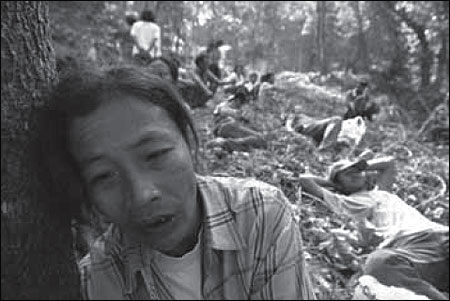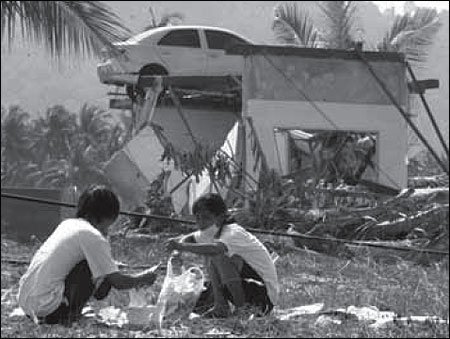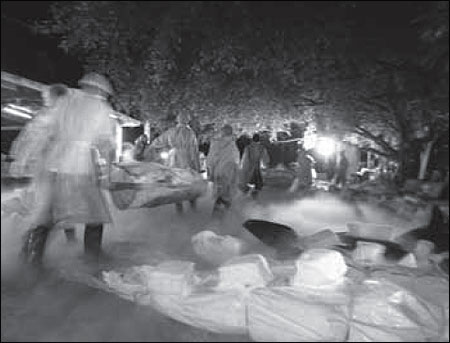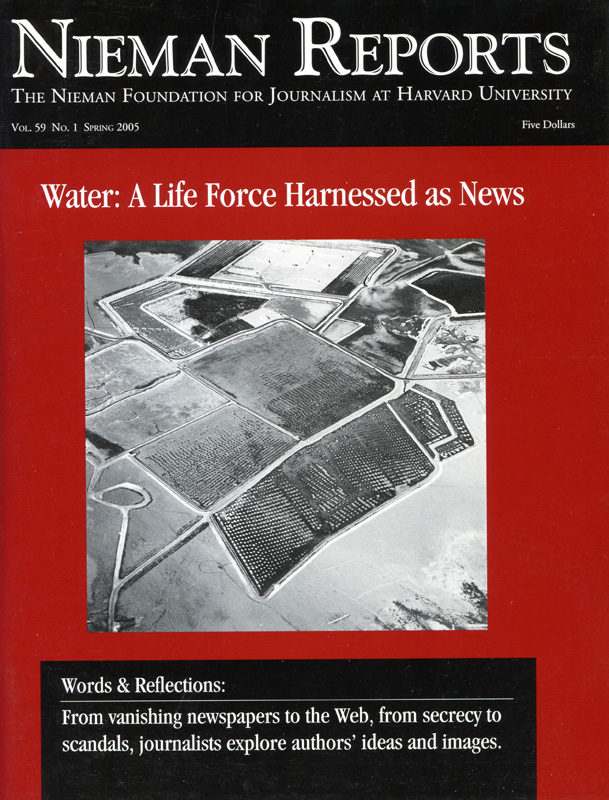
Workers at Jen Jen Resort in Thailand’s Phang Nga’s Takua Pa district rest on a hill after the 10-meter high wave came ashore. Photo by Thawechai Jaowattana/The Nation.
When the tsunami hit Thailand’s coastal line Phuket, Phang Nga and Krabi, nobody in this country would have thought that Mother Nature could inflict such casualties to the land of smile. On Sunday—the day of big waves—The Nation did not have any journalist on the ground, except a group of roving reporters in the south following the news on the simmering tension in Muslim-dominated southern provinces. Our reporters were there because we thought that Islamic militants were planning to bomb strategic areas in Narathiwat and Pattani. But terror of a different kind chose to strike the country’s eastern coast.
The tsunami arrived at the worst time, as journalists were preparing for their long year-end holidays. After frantic phone calls on Monday, that night three reporters were dispatched from Bangkok to the affected areas. None had any prior experience in covering a national disaster. Throughout Monday, all flights to Phuket were cancelled, but in the evening flights resumed, and our three correspondents flew south to begin work on their reporting. However, in the meantime, the government and local authorities had banned journalists from gaining access to the damaged villages and resort areas.
On the second day, estimates of the number of tsunami victims were still only in the range of several dozen. Nobody dared to give a figure, because no one knew the extent of the damage and loss of life. Yet on the first day CNN Headline News indicated that there were likely thousands of deaths, with more expected. Indeed, that became the source by which Thai authorities made their early estimates. The news editors of all TV channels did not believe the high number of death tolls that were coming in from their reporters in the field.
Government-run Channel 11 was the only TV crew present in these first few days at Phuket. Its news coverage was mediocre, in part because the reporter failed to link the earthquake in Sumatra to the creation of the tsunami. In addition, the reporters there were not able to provide any scientific explanation of the waves nor speak to the power of the tsunami’s destructive force. No graphics were used to help explain what had happened. Since most of the journalists and producers were on holidays, they were unable to report to work. On Sunday, the day of the tsunami, most of the nation’s TV channels continued with their usual weekend variety shows and did so without newsbreaks. On that day, the tsunami casualties were covered as a “normal” disaster, not a major disaster of biblical proportion.

Children scavenge after the tsunami. Photo by Charoon Thongnual/The Nation.

On New Year’s Eve, volunteer workers carried dead bodies for identifi cation at Yan Yao Temple in Phang Nga. Photo by Watcharachai Klaipong/The Nation.
Reporters as Eyewitnesses
One of The Nation’s reporters who went to this area, Somluck Srimalee, who normally covered business and the stock market, was asked to file a report from Khao Lak, the popular sea resort in Phang Nga province. Hundreds of foreign tourists were staying there, and hundreds died there. “I saw rescue workers collecting the dead bodies in a five-star hotel,” she told me. “I have never seen so many corpses as I did in a small alley leading to the La Flora Hotel before in my life. I am speechless and almost throw up because of the smell.”
In what she wrote for publication, she was more discreet. “My editor asked me to go to the area where the body of His Majesty, the king’s grandson, Poom Jensen, was found and take photographs of the surroundings. So I have to force myself walking through the debris and wreckage of the hotel and dead bodies. I’m full of despair. After that, I also feel like I am fainting, my knees were weak. I could no longer walk. I asked a passing car for a lift,” she wrote in a story after one week in at Khao Lak.
Srimalee’s saddest moment was when she went to Sofitel Magic Lagoon Resort and Spa in Khao Lak and found a mother waiting tearfully to see her missing daughter, who was working at the hotel when the tsunami struck. “She was waiting in the ruins where the rescue workers were searching for the dead underneath the debris. I wanted to interview her, but somehow my conscious asked me not to do it. It is a great human tragedy,” she recalled.
This reporter’s experiences were certainly not unique. Thai journalists covering the tsunami’s aftermath shared many similar moments, and their psychological reactions to what they saw and heard were much the same. Witnessing so much death and grieving—and doing so in such a close way—can be extremely difficult for reporters. Two journalists from The Nation, after two weeks of coverage, were hospitalized for two days upon their return from reporting because they had breathed too much formaldehyde. They did not wear a mask.
Another business reporter, Jeerawat Na Thalang, was shocked to find out that she had been assigned to cover the tsunami. “I am a real coward, I can barely watch a ghost movie,” she lamented in our newsroom one morning. Yet she thought she was well prepared after watching TV news from the disaster region and talking to colleagues to drum up the courage. “I have a goosebump,” she said, after she went to these areas to report. “Strange thing, the smell of the dead bodies is something you just don’t know without having been through it before. I closed my eyes and kept telling my reporter friends that I would get off the truck, because I did not have mental capacity to deal with it. With my eyes closed, I could smell the death everywhere. Every time I opened my eyes, I saw corpses after corpses before me.
“I remained inside my friend’s car with central lock on. I told my friend I did not want to go out. I am traumatized,” Thalang said. “Even with my eyes closed, I started to smell something intensely. I opened my eyes and saw a few pickup trucks filled with bodies, and one of them was parking next to my car from where I could see exposed corpses on top of each other. I wanted to walk out, but I could not open the car because of central lock system. Gradually, as one hour passed, I still was inside the car. My fear had become too overwhelming. I slowly opened my eyes with my two hands covering my face. After half an hour or so, I was still scared, but I know I have to be there with piles of dead and bloated bodies. I had to go through this and make peace with the corpses.”
Thai journalists are not trained to cover a catastrophe of this proportion. Perhaps no journalist ever could be, but ours were certainly unprepared to endure these emotionally draining scenes. They were flabbergasted by what they saw as soon as they arrived at the scene and snaked through many dead bodies. Of course, they’d never seen anything like this in their lives. At Khao Lak, Don Pathan, a regional editor of The Nation, observed looters going through the piles of the dead inside and outside the five-star hotels. Nobody bothered to stop them. In one case, he said, a hotel manager, who doubled as security guard, chased off looters. Devastated areas were not marked off to outsiders with police tape, so this allowed anybody who had the guts to stroll anywhere they pleased.
As we reflect on the tsunami experience, one lesson Thai journalists have learned is that anything is possible, including a tsunami with such gigantic devastation. From now on, we must be prepared for any circumstance. We realize, too, that we have to pay more attention to issues related to degradation of the natural environment and ongoing global climate changes as well as some unusual phenomenon related to Mother Nature. It is quite interesting to see how the editorial attitude has changed following the tsunami: Any news item related to the global warming now will receive special attention. Nobody ridicules such news items anymore. This next generation of Thai journalists must possess broader knowledge of the world and its environmental condition.
Since some of our journalists had traumatic experiences in covering this story, there have been some consultations between journalists and psychologists. This is not something we have ever done before. In the past, we believe that as journalists we must be able to bear any condition to get the stories without any excuse. This time it is totally different. The scale of destruction and incredible human loss has taken its heavy toll on young and healthy journalists.
Kavi Chongkittavorn, a 2002 Nieman Fellow, is the managing editor of The Nation in Bangkok, Thailand.



